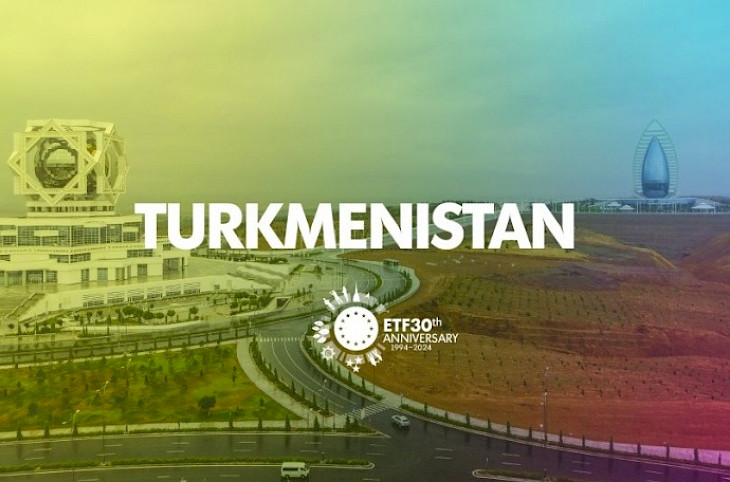The European Training Foundation (ETF) has been cooperating with Turkmenistan since 1995, supporting efforts to modernize education and vocational training systems. This collaboration aligns with the broader goals of the European Union to increase employment, ensure access to opportunities, and strengthen social cohesion in Central Asia. The ETF complements the work of the European Commission and the European External Action Service by sharing experience and best practices from across Europe.
In 2022, the EU launched the DARYA program (Dialogue and Action for Resourceful Youth in Central Asia) — the first-ever regional project aimed at supporting youth in Central Asia, implemented by the ETF. This five-year project, with a budget of €10 million (2022–2027), focuses on enhancing inclusion and developing professional skills in the labor markets of Kazakhstan, Kyrgyzstan, Tajikistan, Turkmenistan, and Uzbekistan, Orient.tm reports.
Deputy Minister of Labor and Social Protection of Turkmenistan, Khalbibi Tachyanova, emphasized the importance of this initiative: "For Turkmenistan, creating opportunities for youth is of great significance and meets the demands of employers. The DARYA program takes into account our country's demographic growth."
Human capital development expert and ETF representative in Turkmenistan, Katarina Lukacova, noted the country's active participation in the DARYA program. "Turkmenistan is fully committed to implementing the DARYA program, including integrating the EU's SCAFFOLD tool into the national system. The country is also interested in adopting evidence-based methods and innovative approaches to qualifications," Lukacova stressed. "Collaboration with key ministries has been at the highest level, reflecting strong mutual commitment."
In September, the ETF conducted a mission in Ashgabat to deepen cooperation and advance DARYA program initiatives. The delegation, led by K. Lukacova and Georgios Zisimos, head of the Policy Recommendations Unit, focused on youth employment, professional skill development, and joint cooperation prospects with other international organizations.
Zisimos and Lukacova held meetings with high-ranking representatives of several ministries, including the Ministry of Education, Ministry of Labor and Social Protection, and Ministry of Foreign Affairs, as well as representatives from organizations such as the State Statistics Committee, the Chamber of Commerce and Industry, and the Union of Industrialists and Entrepreneurs. A joint meeting on education, skills, and employment, organized with the EU delegation, brought together key stakeholders, including UNICEF, the European Bank for Reconstruction and Development (EBRD), and the Asian Development Bank (ADB).
Zisimos remarked, "These meetings highlighted Turkmenistan's prioritization of education, youth, and employment, as well as its commitment to the DARYA program as a tool for progress. Elements of professional skills, qualifications, and training methods are already being integrated into the national plan. This collaboration not only supports EU priorities but also contributes to long-term stability and prosperity in the region."
Recent visits by high-ranking EU representatives to Turkmenistan underscore the strengthening of partnership relations between the European Union and Turkmenistan.
On October 3, European Commissioner for International Partnerships, Jutta Urpilainen, visited Turkmenistan, emphasizing the country's role in the EU's "Global Gateway" strategy. During her visit, she stated: "For the European Union, Turkmenistan is an important partner in Central Asia. On the 30th anniversary of our diplomatic relations, I would like to thank Turkmenistan for its constructive cooperation and for hosting today's high-level meeting of the Coordination Platform for the Trans-Caspian Transport Corridor. My visit to Ashgabat provided an excellent opportunity to discuss a wide range of cooperation areas with the Turkmen government — beyond transport and connectivity, these include climate change, energy, and Turkmenistan’s accession process to the World Trade Organization."
Similarly, on October 4, the EU Special Representative for Central Asia, Terhi Hakala, reaffirmed the EU's long-term commitment to the region through participation in the Coordination Platform for the Trans-Caspian Transport Corridor: "The European Union's involvement highlights our readiness to strengthen regional integration and prosperity in Central Asia and the Caspian region."
As the DARYA program is implemented, cooperation with Turkmenistan continues to grow. Lukacova emphasized: "The integration of EU tools such as SCAFFOLD into Turkmenistan's national system and active participation in DARYA events demonstrate the country's commitment to improving youth skills and employment. The ETF has also recently participated in a national training event on the SCAFFOLD tool."
This work aligns with the EU's broader goals of promoting inclusive development, creating opportunities for youth, and strengthening regional cooperation among the five Central Asian countries and, ultimately, with the EU.
"Turkmenistan has shown a high level of readiness to cooperate with the EU, and the European Training Foundation can act as a bridge through educational and professional initiatives. This partnership opens up vast opportunities for both Turkmenistan and the youth of the entire region," Lukacova concluded.
CentralasianLIGHT.org
December 13, 2024

